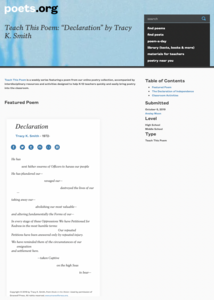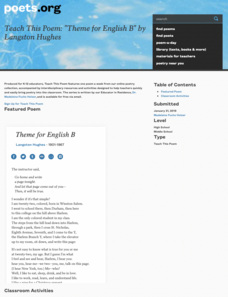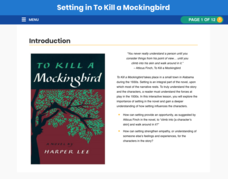K20 LEARN
Active Shakespeare: Making Shakespeare Accessible
Two sonnets, both alike in theme and story, break from ancient language to new glory. The prologue to Act I of Romeo and Juliet provides scholars with an opportunity to examine the language Shakespeare uses to create timeless stories....
Penguin Books
Educator's Guide: The Da Vinci Code by Dan Brown
Dan Brown's The Da Vinci Code is filled with secrets. Help readers find the clues, solve the riddles and puzzles, and unwrap the mysteries with a six-page guide that includes before, during, and after reading discussion questions and...
Merlyn Education and Climate Protection Project
Short Story Lesson Plan: "Ghostwriter" By Kyle Downey
Frankenstein, Mr. Data, Hal, and DEFCON, the computer featured in Kyle Downey’s tale, “Ghostwriter,” all illustrate the dangers of creating intelligent life. After reading Downey’s story, class members craft their own narrative in which...
National Endowment for the Humanities
Toni Morrison's Beloved: For Sixty Million and More
Complex, disturbing, and challenging, Beloved is the focus of a lesson that provides three activities to guide a close reading of Toni Morrison's novel. Readers create chapter titles based on key plot elements or themes, identify...
Academy of American Poets
Teach This Poem: "A New National Anthem" by Ada Limón
Ada Limon's poem, "A New National Anthem," offers young scholars an opportunity to reflect on the significance of the US national anthem and the extent to which Key's vision applies to all Americans. After watching a video of Whitney...
Academy of American Poets
Teach This Poem: “Making History” by Marilyn Nelson
What makes an event newsworthy, worth a reference in a news magazine or textbook? Who decides? These are questions Marilyn Nelson asks readers of her poem "Making History" to consider. To begin, class members list details they notice in...
Academy of American Poets
Teach This Poem: “Declaration” by Tracy K. Smith
Tracy K. Smith's erasure poem "Declaration" challenges scholars to use their noticing skills to make connections between an engraving entitled "The Declaration of Independence" and Smith's poem. Class members record observations and...
Academy of American Poets
Teach This Poem: "A Place in the Country" by Toi Derricotte
Build young scholars' confidence in analyzing art and poetry with a lesson plan that first asks pupils to list details they notice in Edouard Vuillard's painting "Garden at Vaucresson" and then to describe how the painting makes them...
Academy of American Poets
Teach This Poem: "Imagine" by Kamilah Aisha Moon
A lesson about Kamilah Aisha Moon's poem "Imagine" asks young scholars to imagine, "What would happen if...?" If Dr. Martin Luther King's dream became a reality. If Renisha McBride was a white girl and crashed her car in a black...
Academy of American Poets
Teach This Poem: "Old South Meeting House" by January Gill O'Neil
The vaulted ceiling of the Old South Meeting House has heard many voices. Young scholars read an excerpt about its importance in American history and then do a close reading January Gill O'Neil's poem, "Old South Meeting House." After...
Academy of American Poets
Teach This Poem: "Theme for English B" by Langston Hughes
Langston Hughes' "Theme for English B" is featured in a lesson that asks pupils to first read a biography of Hughes and list things about his life they think are important. The class then reads the poem and compares what they learned...
National Endowment for the Humanities
Theme Analysis in A Christmas Carol
Why does Charles Dickens have Ebenezer go from scrooge to light-hearted and generous? From "Bah, humbug!" to "God Bless Us, Every One!" After rereading Dickens' preface to A Christmas Carol, learners analyze quotations from the tale that...
National Endowment for the Humanities
Scrooge as He is Revealed during the Ghostly Experiences
Readers learn how to use both direct and indirect characterization clues provided by Charles Dickens to understand the complexity of Ebenezer Scrooge's character. Scholars collect evidence of comments Scrooge hears, how he responds to...
National Endowment for the Humanities
Language Analysis Based on Stave 1
Class members meet the original scrooge, the Dickens character whose name has become synonymous with a cold-hearted, tight-fisted, miser. Using the provided worksheet, readers closely examine context clues to determine the meanings of...
Digital Public Library of America
The Adventures of Huckleberry Finn by Mark Twain
Mark Twain's The Adventures of Huckleberry Finn is the focus of a teaching guide that introduces readers to some of the many controversies surrounding the use of the novel in classrooms. The packet includes 15 primary source excerpts and...
Academy of American Poets
Teach This Poem: “As I Walk These Broad Majestic Days” by Walt Whitman
Walt Whitman's poem "As I Walk These Broad Majestic Days" offers scholars an opportunity to practice their noticing skills. They first examine a postcard of the Newport News Shipyard listing things they notice about the image and how...
Academy of American Poets
Teach This Poem: "Violin" by Nikki Wallschlaeger
Nikki Wallschlaeger's Violin is the featured poem in a lesson that uses music and multiple readings to delve deep into its analysis. After a writing warm-up, learners watch and listen to a video that showcases Regina Carter Quintet's...
Royal Shakespeare Company
King Lear Teacher Pack 2010
Every production of Shakespeare's plays is different—the director and designer must decide upon a theme. For his 2010 production, David Farr and his team decided to emphasize the conflicts that follow a regime change. The materials in a...
Royal Shakespeare Company
King Lear Teacher Pack 2016
Disguises, deceptions, destruction. Thankless children, wise fools, aging rulers, and knaves. The Royal Shakespeare Company's 2016 King Lear Teacher Pack provides instructors with a wealth of resources for a study of Shakespeare's famous...
Facing History and Ourselves
Literature and Imagination Make Democracy Work
The final lesson in the "What Makes Democracy Work?" series examines the connections between imagination, literature, and democracy. Class members listen to a podcast, read an excerpt from Azar Nafisi's, The Republic of Imagination, and...
PBS
Their Eyes Were Watching God: Socratic Seminar
A Socratic seminar wraps-up a study of Zora Neale Hurston' Their Eyes were Watching God. Using the text and their notes, scholars focus on how characters in the novel accept or reject the societal norms of the times.
PBS
Shifting Perspectives in Toni Morrison's Beloved
An interactive provides readers with an opportunity to record their reactions to Beloved, Toni Morrison's powerful narrative based on the life of Margaret Garner. Prompts ask them to consider how the shifting point of view contributes to...
PBS
Their Eyes Were Watching God: The Impact of Language
Author, filmmaker, and anthropologist Zora Neale Hurston was also a dialectologist. The dialogue of the characters in her novel Their Eyes Were Watching God reveals her fascination with accents and dialects. A short video from the Great...
PBS
Setting in To Kill a Mockingbird
Can you understand more about how a person acts by learning about how that person lives? An interactive resource explores the setting of Harper Lee's To Kill a Mockingbird with several slides discussing the location, social conditions,...

























